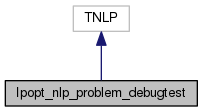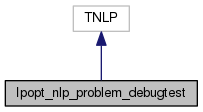|
FFSM++
1.1.0
French Forest Sector Model ++
|
|
FFSM++
1.1.0
French Forest Sector Model ++
|
#include <Ipopt_nlp_problem_debugtest.h>


Public Member Functions | |
| Ipopt_nlp_problem_debugtest () | |
| virtual | ~Ipopt_nlp_problem_debugtest () |
Overloaded from TNLP | |
| virtual bool | get_nlp_info (Index &n, Index &m, Index &nnz_jac_g, Index &nnz_h_lag, IndexStyleEnum &index_style) |
| virtual bool | get_bounds_info (Index n, Number *x_l, Number *x_u, Index m, Number *g_l, Number *g_u) |
| virtual bool | get_starting_point (Index n, bool init_x, Number *x, bool init_z, Number *z_L, Number *z_U, Index m, bool init_lambda, Number *lambda) |
| virtual bool | eval_f (Index n, const Number *x, bool new_x, Number &obj_value) |
| virtual bool | eval_grad_f (Index n, const Number *x, bool new_x, Number *grad_f) |
| virtual bool | eval_g (Index n, const Number *x, bool new_x, Index m, Number *g) |
| virtual bool | eval_jac_g (Index n, const Number *x, bool new_x, Index m, Index nele_jac, Index *iRow, Index *jCol, Number *values) |
| virtual bool | eval_h (Index n, const Number *x, bool new_x, Number obj_factor, Index m, const Number *lambda, bool new_lambda, Index nele_hess, Index *iRow, Index *jCol, Number *values) |
Solution Methods | |
| virtual void | finalize_solution (SolverReturn status, Index n, const Number *x, const Number *z_L, const Number *z_U, Index m, const Number *g, const Number *lambda, Number obj_value, const IpoptData *ip_data, IpoptCalculatedQuantities *ip_cq) |
Private Member Functions | |
Methods to block default compiler methods. | |
The compiler automatically generates the following three methods. Since the default compiler implementation is generally not what you want (for all but the most simple classes), we usually put the declarations of these methods in the private section and never implement them. This prevents the compiler from implementing an incorrect "default" behavior without us knowing. (See Scott Meyers book, "Effective C++") | |
| Ipopt_nlp_problem_debugtest (const Ipopt_nlp_problem_debugtest &) | |
| Ipopt_nlp_problem_debugtest & | operator= (const Ipopt_nlp_problem_debugtest &) |
C++ Example NLP for interfacing a problem with IPOPT. HS071_NLP implements a C++ example of problem 71 of the Hock-Schittkowski test suite. This example is designed to go along with the tutorial document and show how to interface with IPOPT through the TNLP interface.
Problem hs071 looks like this
min x1*x4*(x1 + x2 + x3) + x3
s.t. x1*x2*x3*x4 >= 25
x1**2 + x2**2 + x3**2 + x4**2 = 40
1 <= x1,x2,x3,x4 <= 5
Starting point:
x = (1, 5, 5, 1)
Optimal solution:
x = (1.00000000, 4.74299963, 3.82114998, 1.37940829)
Definition at line 29 of file Ipopt_nlp_problem_debugtest.h.
|
virtual |
|
private |
|
virtual |
Method to return the objective value
Definition at line 96 of file Ipopt_nlp_problem_debugtest.cpp.
|
virtual |
Method to return the constraint residuals
Definition at line 119 of file Ipopt_nlp_problem_debugtest.cpp.
|
virtual |
Method to return the gradient of the objective
Definition at line 106 of file Ipopt_nlp_problem_debugtest.cpp.
|
virtual |
Method to return: 1) The structure of the hessian of the lagrangian (if "values" is NULL) 2) The values of the hessian of the lagrangian (if "values" is not NULL)
Definition at line 175 of file Ipopt_nlp_problem_debugtest.cpp.
|
virtual |
Method to return: 1) The structure of the jacobian (if "values" is NULL) 2) The values of the jacobian (if "values" is not NULL)
Definition at line 131 of file Ipopt_nlp_problem_debugtest.cpp.
|
virtual |
This method is called when the algorithm is complete so the TNLP can store/write the solution
Definition at line 241 of file Ipopt_nlp_problem_debugtest.cpp.
|
virtual |
Method to return the bounds for my problem
Definition at line 40 of file Ipopt_nlp_problem_debugtest.cpp.
|
virtual |
Method to return some info about the nlp
Definition at line 17 of file Ipopt_nlp_problem_debugtest.cpp.
|
virtual |
Method to return the starting point for the algorithm
Definition at line 74 of file Ipopt_nlp_problem_debugtest.cpp.
|
private |